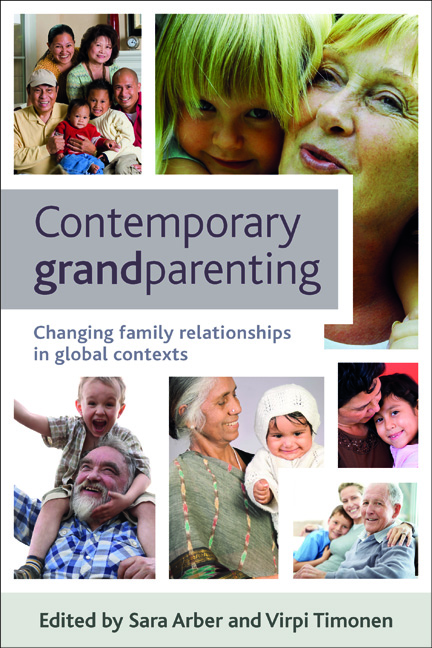eleven - Social contact between grandparents and older grandchildren: a three-generation perspective
Published online by Cambridge University Press: 01 September 2022
Summary
Introduction
The study of the relationships between grandparents and grandchildren is important for various reasons. Being a grandparent is generally a central role in later life (Hodgson, 1992; Mahne and Motel-Klingebiel, 2012). Relationships with grandchildren are reported by the majority of grandparents as among the most important relationships they have (Reitzes and Mutran, 2002; Clarke and Roberts, 2004) and grandparent identity is positively related to wellbeing (Reitzes and Mutran, 2004a). Despite its obvious centrality, the opportunities for the enactment of the grandparental role are subject to change over time.
The transition to grandparenthood is no longer a self-evident life event since fertility rates are declining in most EU countries (Frejka and Sobotka, 2008; Harper et al, 2010). Uhlenberg and Cheuk (2010, p 449) even predict that grandchildren will be in ‘short supply’ in the near future. Moreover, shifting family patterns indicated by greater geographical distance between family members and higher rates of female employment and marital disruption have repeatedly been shown to influence the quality of grandparent–grandchild ties (Uhlenberg and Hammill, 1998; Lussier et al, 2002). Thus, family systems become more complex and the framework for the grandparent–grandchild tie has to be renegotiated throughout the life course (Hagestad, 1985).
The quality of relations with grandchildren is likely to vary among grandparents, and some grandparents may have no or very little contact with their grandchildren. Since grandparenthood is often described as emotionally rewarding and the grandparent role provides important subjective meanings to the majority of grandparents (Kivnick, 1982; Silverstein and Marenco, 2001), the way grandparent–grandchild ties are experienced is a crucial criterion for the quality of later life. The frequency of contact is a tangible indicator of how the relationship between a grandparent and a grandchild is enacted.
While there is consensus on why it is important to study grandparent– grandchild contact, the issue of how to study grandparent–grandchild contact needs further development. Research to date has suggested that the middle generation plays a crucial role as a gatekeeper or facilitator of the grandparent–grandchild connection (Drew and Smith, 1999; Kemp, 2007). It is therefore important to take a three-generation approach when studying the relations between grandparents and grandchildren (Hagestad, 2006). Nevertheless, only a few previous studies have simultaneously considered the specific impact of grandparents, adult children and grandchildren on the frequency of contact between grandparents and grandchildren (Geurts et al, 2009).
- Type
- Chapter
- Information
- Contemporary GrandparentingChanging Family Relationships in Global Contexts, pp. 225 - 246Publisher: Bristol University PressPrint publication year: 2012



